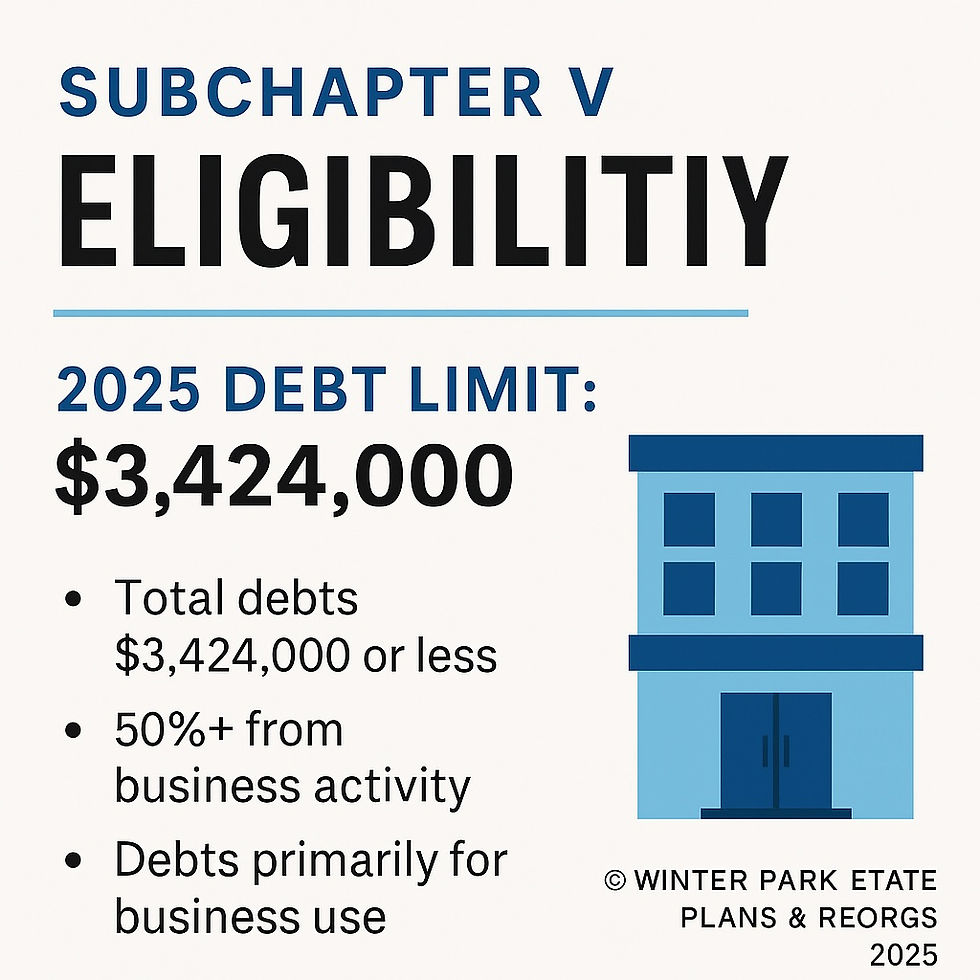Chapter 11 & Subchapter V: Dismissals, Conversions, and Avoiding a Failed Reorg
- Melissa A. Youngman

- Nov 19, 2025
- 4 min read
Updated: Dec 12, 2025
By Winter Park Estate Plans & ReOrgs Admin
Florida Bankruptcy Attorney – Winter Park, FL
Business owners often enter Chapter 11 with one clear goal: to stabilize operations and achieve a successful business reorganization. But between filing day and confirmation, the path can become complicated. Cash flow issues, missed deadlines, or unresolved disputes can derail even a well-planned case.
When a reorganization begins to falter, the court may consider dismissal or conversion of the case, both of which can have serious consequences for Florida business owners.
Understanding the warning signs, the legal standards, and the tools available for successful Florida bankruptcy case management can help prevent a promising reorg from turning into a failed one.

1. What Is Chapter 11 Dismissal?
A Chapter 11 dismissal occurs when the court decides that the bankruptcy case should be terminated entirely. Instead of continuing under court protection, the debtor returns to its pre-bankruptcy status. The stay is terminated once the dismissal order becomes final and the result is as if the bankruptcy case was never filed.
Dismissals may occur when:
The debtor fails to file required documents,
Operating reports are missing or inaccurate,
The business cannot demonstrate feasibility,
Deadlines are repeatedly missed,
Losses continue without a path to profitability, or
The debtor engages in misconduct or fails to comply with court orders.
After dismissal, creditors can immediately resume lawsuits, foreclosures, repossessions, and collections, often placing the business in a worse position than before filing.
Avoiding dismissal requires careful planning, accurate bookkeeping, and strong communication with counsel and the U.S. Trustee.
2. What Is Conversion to Chapter 7?
When a business cannot succeed under Chapter 11, the court may convert the case to Chapter 7, which involves liquidation of assets by a Chapter 7 trustee.
Conversion may occur when:
Reorganization efforts are not credible or realistic,
The debtor engaged in fraud or misconduct during the Chapter 11,
The debtor continues to lose money,
The business is no longer operating or viable, or
The best interests of creditors are best served by liquidation.
Unlike dismissal, conversion keeps the case within bankruptcy court, but the outcome is far more final. Chapter 7 trustees sell assets, close operations, and distribute proceeds to creditors.
For businesses hoping to remain open, avoiding conversion is essential.
3. Why Reorganizations Fail: Common Pitfalls
Even well-intentioned debtors encounter challenges during reorganization. The most common include:
• Poor financial documentation
Incomplete or inaccurate operating reports risk both court sanctions and dismissal.
• Insufficient cash flow
Without the liquidity to meet payroll, rent, and post-petition expenses, the case may quickly unravel.
• Unrealistic projections
Courts require feasible plans supported by credible financial numbers. Overly optimistic forecasts undermine the entire reorg.
• Breakdown in communication
Failing to stay in touch with creditors, the Subchapter V trustee, or counsel can lead to objections, delays, or loss of court confidence. (This can be avoided by hiring an experienced bankruptcy attorney).
• Missed plan deadlines
In Subchapter V, the plan must usually be filed within 90 days. Missing critical deadlines signals systemic issues within the business.
Recognizing these risks early is key to keeping a case on track.
4. Florida Bankruptcy Case Management: Tools for Staying on Course
Florida courts, and especially those in the Middle District of Florida, emphasize transparency, timely reporting, and feasibility. Strong Florida bankruptcy case management includes:
Weekly or monthly financial check-ins,
Tracking all post-petition obligations,
Prompt responses to U.S. Trustee inquiries,
Maintaining insurance, taxes, and payroll,
Early involvement of accountants or financial advisors.
For Subchapter V cases, collaboration with the Subchapter V trustee can be critical. Trustees often help facilitate creditor negotiations and keep the case on a productive timeline.
These proactive management steps make a significant difference between struggle and success.
5. Course Correcting: Fixing a Struggling Reorganization
If a reorg is slipping off track, quick action is crucial. Steps that may save the case include:
• Modifying budgets or projections
Updating financials to reflect reality improves credibility and feasibility.
• Negotiating with critical vendors and lenders
Revised payment terms can stabilize operations temporarily.
• Addressing compliance issues immediately
Curing delinquencies, filing missing reports, or correcting errors restores court confidence.
A struggling case doesn’t have to fail. Experienced bankruptcy counsel can make strategic adjustments that can rescue the reorganization and move it toward confirmation.
6. Building Toward a Successful Reorganization
A successful reorganization requires discipline, transparency, and strong guidance. Businesses emerge from Chapter 11 most successfully when they:
Maintain consistent financial reporting,
Follow the rules provided by the Court, including in its prescribing procedures,
Use realistic projections supported by documentation,
Communicate openly with the court and creditors,
Follow deadlines closely, and
Adapt to changing conditions with timely plan modifications.
With the right team and strategy, Chapter 11 becomes a powerful tool for survival—not a sign of failure.
The Bottom Line
Dismissal or conversion can end a reorganization prematurely, but they are not inevitable. With attentive Florida bankruptcy case management, experienced counsel, and proactive problem-solving, businesses can avoid a failed reorg and chart a path toward profitability and long-term stability.
At Winter Park Estate Plans & ReOrgs, we help Florida business owners navigate challenges, rescue struggling cases, and achieve strong, confirmable plans.
📥 Download Our Chapter 11 Readiness Checklist
Is your business ready to file Chapter 11 or Subchapter V? Use our free Chapter 11 Readiness Checklist to begin the process. Download the Checklist (PDF).
To schedule a free online or phone consultation, please call 📞 (407) 765-3427, or use the Book Now button below.
Read our comprehensive Guide to Florida Chapter 11 and Subchapter V Bankruptcy.




Comments